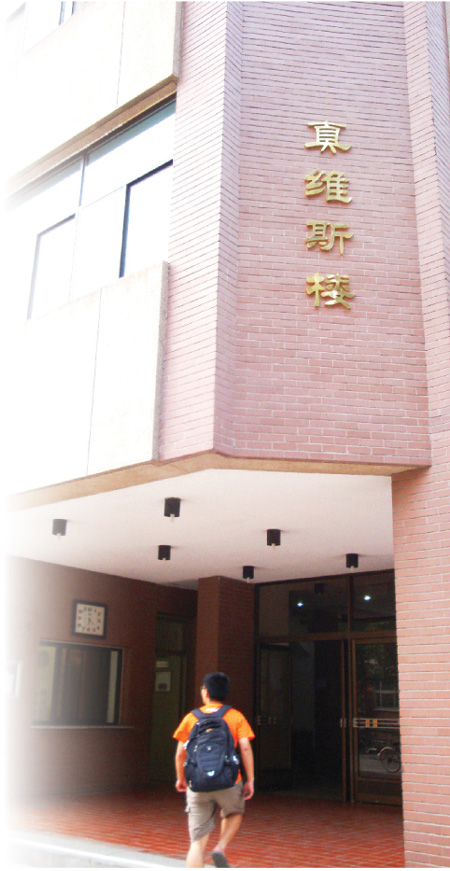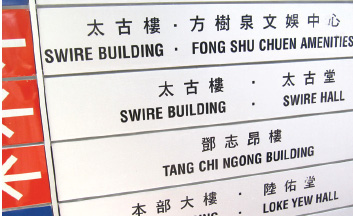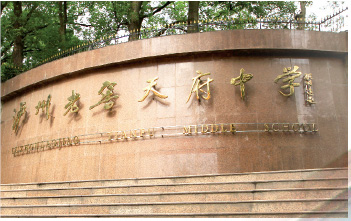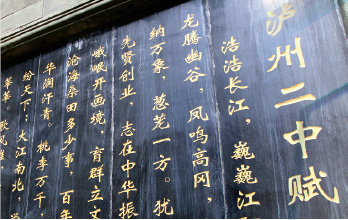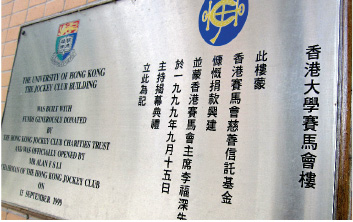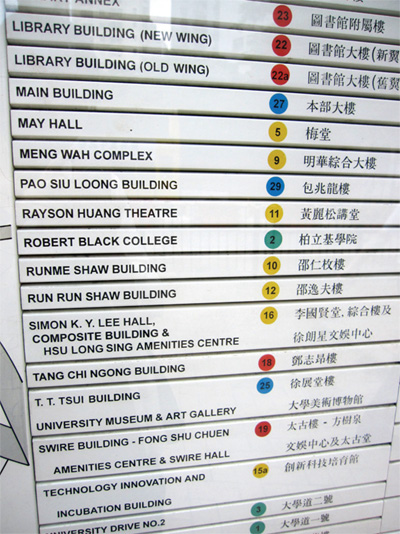Challenging the ivory tower dress code
Updated: 2011-06-24 06:48
By Michelle Fei(HK Edition)
|
|||||||
|
A Tsinghua student is walking into the "Jeanswest Building", former N0 4 Teaching Building. Provided to China Daily |
Why are academic politics so vicious? Because the stakes are so low - attributed to numerous authors. Michelle Fei reports.
The latest "naming drama" played out at Tsinghua University had eventually come to an end, somehow, after the nameplate of the fashion company Jeanswest being removed from the No 4 Teaching Building, after numerous of complaints and criticisms were heard.
However, the curtain didn't go down. The scenario of naming academic buildings after companies has already been widely observed at major universities, or even middle schools in small cities on the mainland.
Another round of discussions was heated and spread to Hong Kong, where such donation-and-naming tradition had existed for a long time.
What took place on that unforgettable day of May 23 was one of those watershed events, capable of generating currents of energized outrage buzzing through the venerable hallways of the venerable Tsinghua University. Alumni were thrown into a tizzy. Some students responded to the effrontery with acts of minor vandalism.
|
A road sign for the Swire Building at the University of Hong Kong. The building was named after the Swire Group. Michelle Fei / China Daily |
What had happened here to cause the university community to react as if the virgin soul of higher education had been violated? The No 4 Teaching Building at the university had been given the name, Jeanswest - the name of a Hong Kong garment manufacturer.
Words of approbation for this naked sell out to corporate self promotion were few. Angry students secretly smeared over the nameplate of "Jeanswest", hanging outside the gate of the No 4 Teaching Building.
The name was over struck and replaced with the simple sentiment, expressed in four hand-written Chinese characters: "I love Tsinghua".
It didn't take a lot in the field of critical thinking skills to identify the source for these feelings of grievance. Most of the complaints held that the schools distinguished name and academic soul had become commercialized in the interests of a fashion company aiming for the youth market.
Tsinghua University wasted no time preparing its response. The very next day, the university called a press conference to explain that corporate sponsorship for academic buildings was "very common practice among universities" and "very reasonable".
The Jeanswest nameplate meanwhile was removed from the wall outside. The reality however was unchanged. The No 4 Teaching Building, now and for the foreseeable future, was to be known officially, as Jeanswest House. As of June 20 the promotional nameplate still was absent from the building, although it's removal was supposed to be temporary.
The press conference failed to defuse the issue. The criteria for learned debate had been met. Around the campus minds of distinction queried, "What's wrong for Tsinghua to wear Jeanswest? "
Was the controversy about a bourgeois intrusion into the ivory towers of academe, or was it the will of a group of reactionary snobs clinging to effete stereotypes and intellectual snobbery?
"For me, it's nothing but a fair deal. Tsinghua asked for a price and Jeanswest is willing to pay the bill," said Tao Zhigang, revealing a practical turn of mind of a professor in the Faculty of Business and Economics at the University of Hong Kong.
"However, it's definitely a good deal for Jeanswest. Like it or not, the company already has a big increase in brand awareness."
|
Receiving donations from companies goes increasingly popular on the mainland, even for middle schools at small cities. The century-old Luzhou No 2 Middle School in Luzhou, Sichuan province, has been named after Luzhou Laojiao, a local liquor producer. Kevin Li / for China Daily |
"What is really strange is for Tsinghua to remove the nameplate. Was it a compromise to social pressure, or discrimination against the relatively young brand Jeanswest?" said Tao.
"Society should not discriminate against relatively young brands."
The high-controversy over "Jeanswest House" was not the first case. It's not likely to be the last for Tsinghua, or for other universities and colleges.
"Mong Man Wai Building" and "Lee Shau Kee Technology Building" have been fixtures on the Tsinghua campus for years.
The names were bestowed after the two Hong Kong business tycoons made handsome endowments to the university.
Then there's Tsinghua's No 6 Teaching Building, renamed in honor of Yue Yuen Industrial Holdings Limited, a Hong Kong company that makes shoes.
Most students and staffs ignore the name - that's been in place for years. They refer to it as building No 6.
In the wake of all the controversy surrounding Jeanswest House, somebody set up an online survey. Over 9,000 people clicked on to contribute their views and among those, 58 percent declared themselves against "title sponsorship", appealing instead for a kind of environmentalism to protect the academic never-land and the natural habitat for young fertile minds. Another 24 percent reckoned that it's okay for academic buildings being named after companies, except for companies named Jeanswest, whose very existence is right out of touch with the world of academe and irrelevant to it. Only 18 percent of the people who took part said they approved of the new name.
"It's humiliating for me see the name of a rather low-end fashion company crowning the building. The university was famous for its lofty soul; yet now it bowed to commercial interests" said a PhD student of the university surnamed Liu.
Meanwhile, in Hong Kong, where the tradition of donations for name recognition has existed for over a century, controversies are seldom heard, yet the students at faculty in Hong Kong "understood" the sentiments of their cross-border peers.
|
A poetry carved on the front wall of the school reminded visitors of the middle school's original name. Kevin Li / for China Daily |
"I don't really know much about the Jeanswest Company, but I could understand the feelings of the students," said Professor Agnes Lam, an associate dean of the Faculty of Arts at the University of Hong Kong.
"Our students used to have hard feelings when one of our faculties was about to be named after a local rich man, however, the debate eventually quieted down," said Lam.
The University of Hong Kong, which is also a world top-ranked university, had a long history of raising donations from society.
It was not hard to find campus buildings named after the wealthy, entertainment celebrities or companies. There's the Swire Building, as one example.
"We felt nothing when we saw the Swire Building on campus. For one thing, the company had already been around for many years, and it had a long history of donating to universities and running charities," said Lam.
Lam reckoned that she had never be invited to any kind of public consultation about these endowments in exchange for name recognition but she thinks there must have been a committee somewhere in back of the naming decision.
The new fashion
Debate over the naming issue does not stop at "Jeanswest House". It just pricked the ongoing controversy over "commercial intrusion" into the fastness of the ivory tower.
The issue is no overnight phenomenon; it's been around and evolving for quite some time. Academic institutions and commercial enterprises have been cozying up to each other for a long time.
|
Nameplate of the Jockey Club Building at the University of Hong Kong. Michelle Fei / China Daily |
The Tsinghua University Education Foundation website proffers for sale the naming rights of more academic buildings, scholarship foundations and public squares on campus. Twenty-nine of them already are listed as sold. The foundation expects to raise between 3 million yuan (HK$3.57 million) to 138 million yuan (HK$164 million).
Top universities in Beijing already offered the same. Peking University has a conference hall named after Alibaba Group. China's leading electronics commerce company made a $1million to the university in 2009.
Realistically, there is already a tradition of corporate sponsorship that extends not only to big universities but to middle schools in small cities.
In Luzhou, a small city in the southeastern part of Sichuan in southwest China, a century-old middle school recently changed its name after a local liquor production company made a donation.
Local people joked that the new name made people think that "the school is for alcoholics".
The right 'dress code'
"Higher education bodies should never go commercial. It's fine for companies to make donations to help the development of schools, however, such donations should not affect the independence of schools; otherwise it would only backfire," said Joldy Li, a professor of Luzhou Medical College.
There must be experiences for mainland universities to learn from Hong Kong where the tradition of raising funds and giving naming rights in return has existed for a long time.
"It's an established tradition to name an object at the university (building, space, facility, center, professorship, program and others) after a person or a party. The name of the person or party leaves a mark on the history of the university as a way of recognition, celebration and memory," said a spokesman for the University of Hong Kong.
Apart from benefactors and supporters, there are also other buildings and entities at the University of Hong Kong named after former vice-chancellors - for example, Eliot Hall after the first Vice-Chancellor Sir Charles Eliot; the Knowles Building after former Vice-Chancellor Hon William Charles Goddard Knowles.
Most of the "crowned" academic buildings at Hong Kong universities were named after individuals, including business tycoons, political leaders, and local celebrities.
Seldom have buildings been named after companies in Hong Kong.
"Universities should be very careful with donations and be very careful in choosing the donors. What if the money was not that 'clean'? What if the company goes bankrupt one day?" asked Tao Zhigang.
Tao recalled there used to be cases in the United States of companies sponsoring research programs in universities but asked for "positive" research results favoring its own products in return.
"The crux of the problem is that universities should always stick to their own principles. The usage of the money should never be limited by donors," reckoned Tao.
Meanwhile, on the website of the Tsinghua Education Foundation, where 29 more "naming right" waiting to be sold, the foundation says the university will use the money in accordance with the willing of donators while it claims it "welcomed any kind of donations from the society".
Phone calls to the foundation office remained unanswered.
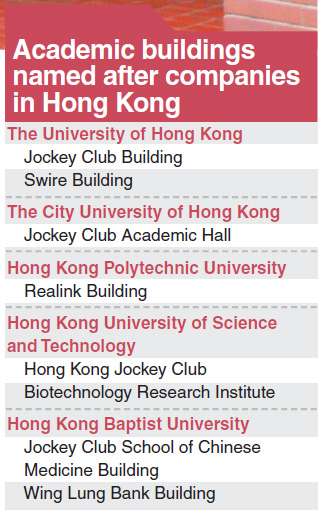
|
A road sign at the University of Hong Kong displays a number of buildings named after donators. Photo by Michelle Fei |
(HK Edition 06/24/2011 page4)
